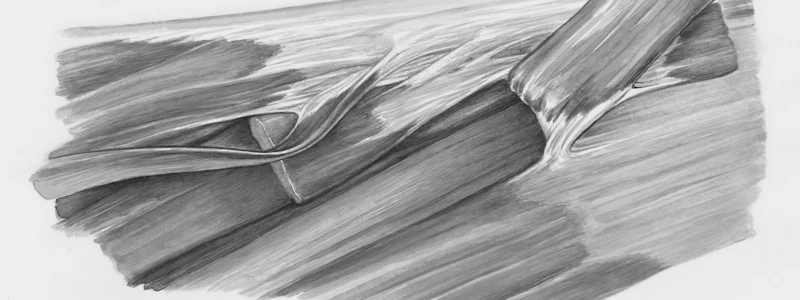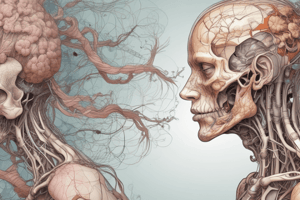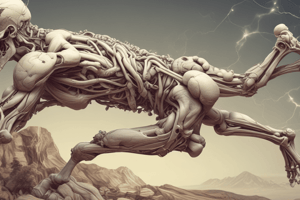Podcast
Questions and Answers
What is the primary focus of anatomy?
What is the primary focus of anatomy?
- Functions of body systems
- The processes of digestion
- Behavioral responses of the body
- The science of body structures (correct)
Which plane divides the body into unequal right and left portions?
Which plane divides the body into unequal right and left portions?
- Transverse plane
- Parasagittal plane (correct)
- Frontal plane
- Midsagittal plane
What anatomical term describes a cut made at a diagonal angle?
What anatomical term describes a cut made at a diagonal angle?
- Transverse section
- Sagittal section
- Oblique section (correct)
- Longitudinal section
Which anatomical region includes the chest, abdomen, and pelvis?
Which anatomical region includes the chest, abdomen, and pelvis?
What does the frontal or coronal plane divide?
What does the frontal or coronal plane divide?
What section of the body does the median plane pass through?
What section of the body does the median plane pass through?
Which section is lengthwise through the body?
Which section is lengthwise through the body?
What anatomical region is responsible for supporting the head?
What anatomical region is responsible for supporting the head?
What is the main function of the circulatory system?
What is the main function of the circulatory system?
Which position is characterized by the upper limbs at the sides and palms facing forward?
Which position is characterized by the upper limbs at the sides and palms facing forward?
What does the lymphatic system primarily do?
What does the lymphatic system primarily do?
What components are included in the lymphatic system?
What components are included in the lymphatic system?
Which cell types are involved in the immune response within the lymphatic system?
Which cell types are involved in the immune response within the lymphatic system?
What is the main function of the reproductive system?
What is the main function of the reproductive system?
Which hormones are produced by the ovaries and testicles?
Which hormones are produced by the ovaries and testicles?
What does the term 'superior' refer to in anatomical terms?
What does the term 'superior' refer to in anatomical terms?
In anatomical terminology, what does 'caudal' relate to?
In anatomical terminology, what does 'caudal' relate to?
Which region does the term 'rostal' refer to?
Which region does the term 'rostal' refer to?
What term describes a position towards the front of the body?
What term describes a position towards the front of the body?
Which anatomical term describes a structure that is further away from the trunk?
Which anatomical term describes a structure that is further away from the trunk?
In anatomical terms, what term refers to the backside of the body?
In anatomical terms, what term refers to the backside of the body?
What is the correct anatomical term for the wrist?
What is the correct anatomical term for the wrist?
Which term signifies the surface of the body?
Which term signifies the surface of the body?
What anatomical term is used for the area of the lower back?
What anatomical term is used for the area of the lower back?
Which of the following terms refers to the pelvis?
Which of the following terms refers to the pelvis?
What is the term for the area behind the knee?
What is the term for the area behind the knee?
Which term indicates a position closer to the midline of the body?
Which term indicates a position closer to the midline of the body?
Which of these terms describes the forehead area?
Which of these terms describes the forehead area?
What system is responsible for breaking down foods into nutrients for energy and growth?
What system is responsible for breaking down foods into nutrients for energy and growth?
Which system includes the brain and spinal cord as its primary components?
Which system includes the brain and spinal cord as its primary components?
Which system plays a major role in producing blood and lymph cells?
Which system plays a major role in producing blood and lymph cells?
What is considered one of the most complicated systems in the body?
What is considered one of the most complicated systems in the body?
Which components are included in the skeletal system?
Which components are included in the skeletal system?
How many bones are in the axial skeleton?
How many bones are in the axial skeleton?
What part of the body is included in the peripheral nervous system?
What part of the body is included in the peripheral nervous system?
Identify a component that is part of the immune system.
Identify a component that is part of the immune system.
Flashcards are hidden until you start studying
Study Notes
Anatomy
- Anatomy is the science of body structures and their relationships.
- Terms derived from Greek: "Ana" means up, and "Tomy" means the process of cutting.
- Various anatomical sections include:
- Transverse Section: Crosswise division (horizontal cut).
- Oblique Section: Diagonal cut through the body.
- Longitudinal Section: Division lengthwise.
Physiology
- Physiology studies how body parts function and work together.
Anatomical Planes and Sections
- Sagittal/Longitudinal Plane: Divides the body into right and left sections.
- Median Plane: Passes through the midline, dividing into equal halves.
- Parasagittal Plane: Divides the body into unequal right and left sides.
- Frontal/Coronal Plane: Separates anterior (front) and posterior (back) portions.
- Key positions:
- Proximal: Closer to the center or attachment point (e.g., shoulder to elbow).
- Distal: Further from the center (e.g., phalanges are distal to carpals).
- Superficial/External: Towards the body's surface (e.g., ribs are superficial to lungs).
- Deep/Internal: Away from the body's surface (e.g., ribs are deep to skin).
Anatomical Terms
- Front: Anterior; Back: Posterior.
- Head: Cephalic; Skull: Cranial; Face: Facial; Neck: Cervical.
- Arm: Brachial; Wrist: Carpal; Chest: Thoracic; Abdomen: Abdominal.
- Leg: Crural; Foot: Pedal; Calf: Sural; Sole: Plantar.
Anatomical Position
- Individual stands upright, facing forward with arms at sides and palms forward.
- Feet are flat and directed forward.
Organ Systems Overview
- Circulatory System: Transports oxygen and nutrients while removing waste products.
- Lymphatic System: Drains excess fluid, transports nutrients, and boosts immune responses.
- Respiratory System: Facilitates gas exchange (oxygen and carbon dioxide).
- Musculoskeletal System: Provides structure and facilitates movement and physical abilities.
- Skeletal System: Comprises 206 bones, supporting the body and enabling mobility.
- Digestive System: Breaks down food into nutrients for energy and growth (includes mouth to anus).
- Nervous System: Central command structure for communication between body parts (brain and spinal cord form the CNS).
- Immune System: Defends against infections; involves lymph nodes, bone marrow, and other immune organs.
- Reproductive System: Completes biological reproduction, involving specific organs and hormone production.
Directional Terms
- Superior: Above another part (e.g., heart is superior to liver).
- Cranial: Toward the head (e.g., stomach is more cranial than bladder).
- Inferior: Below another part (e.g., stomach is inferior to lungs).
- Rostral: Toward the facial area (e.g., frontal lobe is rostral to occipital lobe).
- Caudal: Toward the tail or posterior part (e.g., lumbar vertebrae are caudal to cervical vertebrae).
Studying That Suits You
Use AI to generate personalized quizzes and flashcards to suit your learning preferences.





